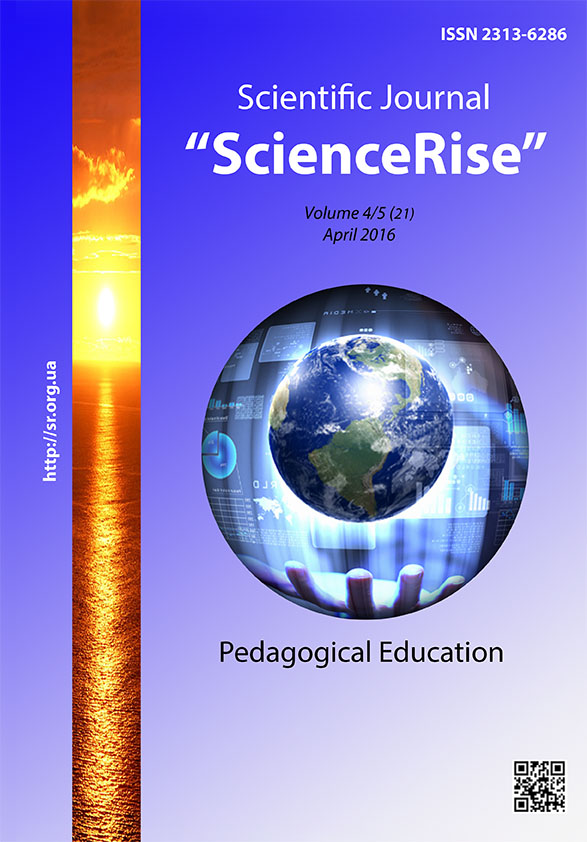Pedagogical conditions of generating professional competence for future marketers by the means of interactive technologies
DOI:
https://doi.org/10.15587/2313-8416.2016.66507Keywords:
professional preparation, future marketers, professional competence, pedagogical conditions, interactive technologiesAbstract
The article proves that one of the main tasks of higher economic education modernization is the search for innovational approaches to professional preparation of marketers in order to generate professional competence. Having the scientific literature analyzed, the essence of professional competence is defined more precisely. The urgency of generating the professional competence for future marketers with the help of interactive technologies is stated. In the process of investigation the following issues were determined: the creation of professional and motivational surrounding by the means of interactive technologies; ensuring integrating approach to generating the professional competence for future marketers; involving students into quasi-professional activity based on business and role-playing games; the intensification of students’ self-educating activity by the means of interactive technologies.
The main factors, which are characteristic of the approach to the choice of pedagogical conditions are distinguished. They are methodical generation of professional competence for future marketers; representation of fulfillment of the mechanism how to produce professional competence for future marketers in the process of teaching with the help of interactive technologies; ensuring a step-by-step process of generating the professional competence for future marketers by the means of interactive technologies while implementing the functions of teaching, training and developing; systematic consideration of general didactic and specific principles of teaching
References
Dorofeev, A. (2005). Professional'naja kompetentnost' kak pokazatel' kachestva obrazovanija. Vysshee obrazovanie v Rossii, 4, 30–33.
Kajdalova, L. G. (2006). Teoretychni zasady kompetentnisnogo pidhodu do profesijnogo navchannja. Problemy inzhenerno-pedagogichnoi' osvity, 3, 21–25.
Pishhulin, V. N. (2006). Formirovanie professional'noj kompetentnosti specialista jekonomicheskogo profilja v sisteme universitetskogo obrazovanija. Moscow, 172.
Borysenko, L. L. (2011). Psyhologo-dydaktychni umovy formuvannja naukovo-piznaval'noi' kompetentnosti studentiv ekonomichnyh special'nostej. Vyshha osvity Ukrai'ny, V, 36–42.
Maksymchuk, L. V. (2012). Pedagogichni umovy zastosuvannja interaktyvnyh tehnologij u pidgotovci majbutnih ekonomistiv-mizhnarodnykiv. Visnyk Nacional'noi' akademii' prykordonnoi' sluzhby Ukrai'ny imeni B. Hmel'nyc'kogo, 1. Available at: http://www.nbuv.gov.ua/e-jornals/Vnadps/2012_1/10mlvmem.pdf
Metodychni zasady efektyvnogo formuvannja profesijno znachushhyh umin' ta navychok majbutnih ekonomistiv (2010). Khmelnyck: HNU, 43.
Mel'nychuk, I. M. (2008). Naukovo-metodychni zasady vprovadzhennja interaktyvnyh tehnologij u vyshhij shkoli. Naukovyj chasopys Nacional'nogo pedagogichnogo universytetu im. M. P. Dragomanova. Ser.: Pedagogichni nauky: realii' ta perspektyvy, 11,183–190.
Maksymchuk, L. V., Romanyshyna, L. M. (2010). Zastosuvannja interaktyvnyh tehnologij u pidgotovci majbutnih ekonomistiv-mizhnarodnykiv do profesijnoi' dijal'nosti. Pedagogika formuvannja tvorchoi' osobystosti u vyshhij i zagal'noosvitnij shkolah, 11 (64), 243–248.
Koval'chuk, G. O. (2003). Aktyvizacija navchannja v ekonomichnij osviti. Kyiv: KNEU, 298.
Kremen', V. G. (Ed.) (2008). Encyklopedija osvity. Kyiv: Jurinkom Inter, 1040.
Downloads
Published
Issue
Section
License
Copyright (c) 2016 Світлана Євгенівна Адамів

This work is licensed under a Creative Commons Attribution 4.0 International License.
Our journal abides by the Creative Commons CC BY copyright rights and permissions for open access journals.
Authors, who are published in this journal, agree to the following conditions:
1. The authors reserve the right to authorship of the work and pass the first publication right of this work to the journal under the terms of a Creative Commons CC BY, which allows others to freely distribute the published research with the obligatory reference to the authors of the original work and the first publication of the work in this journal.
2. The authors have the right to conclude separate supplement agreements that relate to non-exclusive work distribution in the form in which it has been published by the journal (for example, to upload the work to the online storage of the journal or publish it as part of a monograph), provided that the reference to the first publication of the work in this journal is included.

